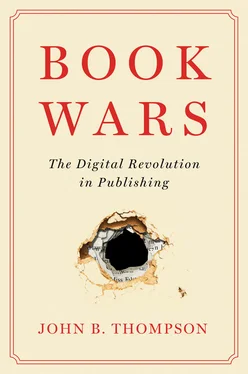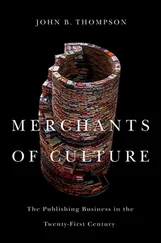It quickly became clear that Byliner needed to find another revenue model – individual transactions at 99¢ with a 30 per cent fee to the vendors simply wasn’t going to generate enough revenue to make this a viable business. So they began experimenting with a subscription model that would give readers access to all its content through its website and mobile apps for a monthly subscription of $5.99. But they didn’t get enough subscribers to make this work. Perhaps it was too early for a subscription model, maybe consumers were not yet accustomed to paying for reading material in this way – ‘I’m still not convinced that there is a viable business model for subscription at that level’, reflected John, ‘but if there is, it’s still two, three, four years away. And so we just sort of flat-lined.’
Byliner’s trajectory was not uncommon for a VC-funded start-up in Silicon Valley. Like most start-ups of this kind, they were going for growth so that they could ‘own’ the category. Profitability was not the key concern in the early stages, either for the senior managers of Byliner or for their financial backers. ‘We were what they call out here “pre-revenue”’, said John, a little facetiously. ‘There wasn’t a tremendous amount of pressure to get to profitability as long as we were showing growth. So as long as the numbers are going up, you just lean into that growth.’ Venture capitalists typically want to see a growth trajectory that suggests either you will hit profitability eventually or you will get acquired. They keep an eye on ‘the burn’ – ‘you know, how much your monthly expenses are, what you’ve got coming in.’ Byliner was generating a seven-digit revenue, ‘but for a VC-funded company those numbers aren’t interesting’. So the VCs were hoping that Byliner would be acquired. ‘And you take VC money, you’re assuming that your exit is going to have a multiple’, continued John. For technology investors in Silicon Valley, the multiples can be as high as 20, 50 or 100 times what they’re putting in, though multiples of that kind are rare. Investors recognize that most of their investments will fail; they’re looking for a return on one in ten investments, and one has to hit at a multiple that will compensate for the losses accrued by the other nine. The VCs who had invested in Byliner soon realized that they weren’t going to be able to exit with a serious multiple, but they hoped nonetheless that they would be able to exit with something – what’s euphemistically described in VC jargon as a soft landing.
In early 2014, Byliner was at a critical juncture. They weren’t generating enough revenue to sustain a viable business at their current level of staffing, and they were unlikely to be able to raise further venture capital given their trajectory of growth. Could they have scaled back, reduced their staff and overheads and restructured the business as a small, boutique publishing operation specializing in e-singles? Possibly. That might have been an option. But scaling back and turning yourself into a boutique business is not part of the script for a VC-funded company – it’s not an option that would be of any interest to their investors. Nor did this option appeal to its founder. He had already devoted four years of his life to pursuing this particular dream and given it everything, so the idea of managing the decline of the business was hardly an attractive prospect. Moreover, he was finding it difficult to hold on to his staff, especially the software engineers. ‘This is such a super-heated growth environment that for anyone who’s on the technology side, there are many better opportunities than trying to eke out a nice little nifty publishing play. It’s hard to get and retain staff, and be honest with staff, because they’re going to lunch with people whose company trajectories are from launch product to hundred-million-dollar acquisition in months, much less years.’ Staff began to leave, and John himself got tired. ‘I’m a writer, and I hadn’t written anything for four years. I found myself running a company and going into the office every day and not being excited about the growth.’ He took a back seat, brought in someone else to run the company and started doing other things. In September 2014, it was announced that Byliner had been sold to Vook, a New York-based company that offers digital publishing services to authors and organizations. 4It’s not exactly the exit John would have liked – ‘I would have loved for the team to have a giant exit’, he confessed. But there’s no shame in a soft landing either.
The three-year story of the rise and fall of Byliner suggests that, while there may well be a market for short books published as ebooks only, this market is probably not sufficiently robust to support a standalone publishing operation. The flooding of the market with content and the downward pressure on prices, creating a category where 99¢ has become the norm, have meant that it’s difficult to generate revenue growth and achieve profitability on the basis of publishing e-singles only. Byliner was able to pioneer the development of e-singles with the help of venture capital funding but it never achieved the kind of growth or scale that was meaningful in the VC world of Silicon Valley, and never achieved the kind of profitability that might have enabled it to float off as a boutique indie publisher, even if that option had been open to it. It published some remarkable and successful books in its short life, but the model was unsustainable in the long run.
But maybe Byliner had been too conservative. Maybe you needed to be more radical in the way you were thinking about digital publishing – not just doing ebooks that were shorter than traditional print books, but experimenting in more fundamental ways with the very form of the book, creating ebooks that incorporate the multimedia features that are possible in the digital medium. Maybe another venture with a more radical agenda would stand a greater chance of success – would it?
In 2012, the media businessman Barry Diller and film producer Scott Rudin approached the former Vintage and Picador publisher Frances Coady with the idea of starting a new kind of publishing company. Barry was Chairman of IAC/InterActiveCorp, a large digital media company headquartered in the Frank Gehry-designed building in the Chelsea district of New York; they owned a range of internet-based businesses, including The Daily Beast and match.com, the online dating service, and they were looking for new ideas to expand their digital holdings. Why not try to invent a new kind of publishing for the digital age? Start afresh, find someone very clever who knows a lot about publishing, invest a substantial amount of money – say $20 million – and see what happens. Try to imagine what the book is going to look like in ten, twenty, thirty years’ time and create it now. Experiment with the future. This was 2012 and the digital revolution was in full swing. Ebooks were soaring and the future was digital, surely. Here was a well-funded opportunity to marry the old world of publishing with the new world of hi-tech. For someone with a love of books and a taste for adventure, the opportunity was irresistible – Frances couldn’t say no. She suggested to Barry and Scott that they should consider collaborating with The Atavist Magazine, a Brooklyn-based internet start-up that had built a platform to experiment with new kinds of storytelling in an online environment. It was a great platform, visually beautiful, and it enabled people to engage with stories in innovative ways. They would be the perfect partner: Frances and her colleagues could use their platform and benefit from their technical skills, and The Atavist Magazine, as a hard-pressed start-up, would welcome a cash injection. And so, in September 2012, Atavist Books was born.
Читать дальше












